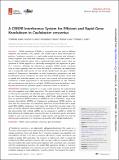A CRISPR Interference System for Efficient and Rapid Gene Knockdown in Caulobacter crescentus
Author(s)
Guzzo, Mathilde; Castro, Lennice K.; Reisch, Christopher R.; Guo, Monica S.; Laub, Michael T.
DownloadPublished version (3.209Mb)
Terms of use
Metadata
Show full item recordAbstract
CRISPR interference (CRISPRi) is a powerful new tool used in different organisms that provides a fast, specific, and reliable way to knock down gene expression. Caulobacter crescentus is a well-studied model bacterium, and although a variety of genetic tools have been developed, it currently takes several weeks to delete or deplete individual genes, which significantly limits genetic studies. Here, we optimized a CRISPRi approach to specifically downregulate the expression of genes in C. crescentus. Although the Streptococcus pyogenes CRISPRi system commonly used in other organisms does not work efficiently in Caulobacter, we demonstrate that a catalytically dead version of Cas9 (dCas9) derived from the type II CRISPR3 module of Streptococcus thermophilus or from Streptococcus pasteurianus can each be effectively used in Caulobacter. We show that these CRISPRi systems can be used to rapidly and inducibly deplete ctrA or gcrA, two essential well-studied genes in Caulobacter, in either asynchronous or synchronized populations of cells. Additionally, we demonstrate the ability to multiplex CRISPRi-based gene knockdowns, opening new possibilities for systematic genetic interaction studies in Caulobacter. IMPORTANCE Caulobacter crescentus is a major model organism for understanding cell cycle regulation and cellular asymmetry. The current genetic tools for deleting or silencing the expression of individual genes, particularly those essential for viability, are time-consuming and labor-intensive, which limits global genetic studies. Here, we optimized CRISPR interference (CRISPRi) for use in Caulobacter. Using Streptococcus thermophilus CRISPR3 or Streptococcus pasteurianus CRISPR systems, we show that the coexpression of a catalytically dead form of Cas9 (dCas9) with a single guide RNA (sgRNA) containing a seed region that targets the promoter region of a gene of interest efficiently downregulates the expression of the targeted gene. We also demonstrate that multiple sgRNAs can be produced in parallel to enable the facile silencing of multiple genes, opening the door to systematic genetic interaction studies. In sum, our work now provides a rapid, specific, and powerful new tool for silencing gene expression in C. crescentus and possibly other alphaproteobacteria.
Date issued
2020-01Department
Massachusetts Institute of Technology. Department of BiologyJournal
mBio
Publisher
American Society for Microbiology
Citation
Guzzo, Mathilde et al. "A CRISPR Interference System for Efficient and Rapid Gene Knockdown in Caulobacter crescentus." mBio 11 (January 2020): e02415-19. © 2020 Guzzo et al.
Version: Final published version
ISSN
2150-7511